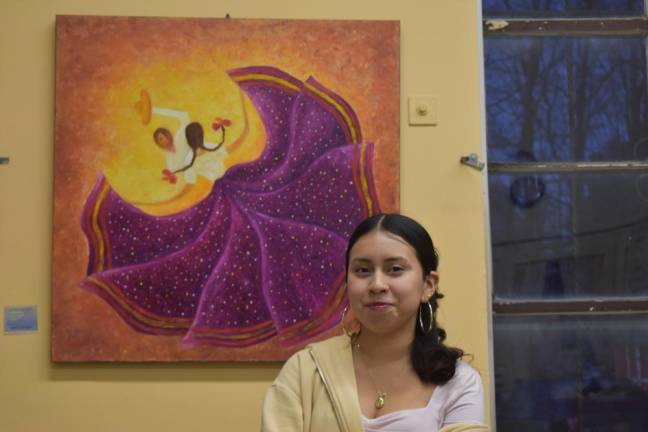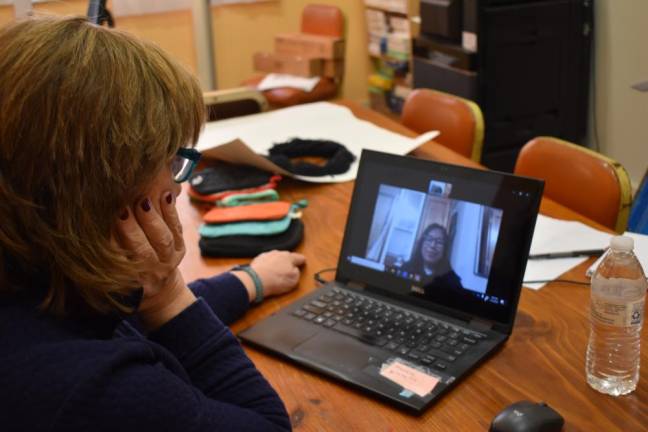Black dirt’s newest crop: teen health advocates
The college-bound children of farmworkers step up as a ‘bridge’ for their community


Celine Arizpe Benitez and Sharlin Barragan Lara, honors students whose Mexico-born parents have worked as farmhands, are pondering careers very unlike their parents’. Celine, 18, a Warwick Valley High School graduate, is majoring in business at SUNY Oneonta. Sharlin, 17, a Minisink Valley High School senior, is applying to colleges to study occupational therapy or biology.
They’re the first of their kind in another way, too. The young women are part of a group of 19 teenagers from the Warwick Area Farmworkers Organization that recently graduated from a yearlong community health worker training designed by Morehouse College, a historically Black institution on a mission to diversify the public health workforce. These teens, the children of farmworker families, are the first in New York State to get certified as student community health workers.
Dirt sat down with the students, one in person and one on Zoom from her college dorm, along with Katherine Brieger, executive director of Warwick Area Farmworkers Association.
“Some of these families I’ve known for three generations now,” said Brieger, who’s been doing this work 35 years. “I don’t want to stop with these kiddos. I want to keep on going, because in that group – every 19 that graduate – we’re building skills, building confidence, and I’m hoping there will be some more healthcare professionals.” Interview by Becca Tucker and Aubrey Cordero
Tell us about the work your parents do.
Celine: My parents used to work on the farm when they were younger, and I worked at an apple orchard in high school, but as of now they have gone on to other careers. We have a lot of relatives that do farm work back at home. Most of my family’s in Mexico. They grow potatoes, tomatoes, avocadoes.
Sharlin: My dad and uncles work in the fields and my mom helps out sometimes. They pick sweet potatoes, onions, garlic, basically every vegetables you can think of. It’s been since I was born. Sometimes I would help them out, too, if they needed help, especially in the spring.
What was it like helping in the fields?
S: I had a hard time because it was really hot. The dust, the wind, it was terrible, and my back would hurt after a day of working out there. The conditions were rough, especially doing that every day must be really hard on your health and stuff.
What do people not realize about farmworkers?
S: They’re very hardworking, dedicated, spending all these hours outside, working and working. I think their efforts aren’t seen as much. I guess there’s a job hierarchy: if you’re a doctor, you’re smart, bla bla bla. For farmworkers, it’s the lower portion I guess, because they’re not seen as educated or smart or hardworking, just because they’re not valued.
C: Farmworkers are usually seen as lower class, they don’t earn as much of a living compared to other careers, and it’s really just seen as a job that’s a last option. Which is not [always] the case: some people actually like to do the work outside. Some people like to help the community with providing fresh foods.
Wherever you are career-wise, most of the time it’s not where you could be at your full potential, because a lot of people do have potential for other things, it’s just that there are other factors that come into play where it limits them. I would just say that ‘farmworker’ isn’t a limitation.
What was something valuable you learned in the community health worker training?
C: As community health workers, there’s that blurred line between the medical professionals and the patients, so we’re that bridge gateway where any communication kind of goes through us so we can communicate more effectively with both the medical professionals and the patients.
My family has a lot of history of diabetes, and we did a project focused on diabetes. I learned how to take care of myself, having plenty of exercise, what I can be eating, what I can’t be eating, how to regulate my health. It’s been something that my family always talks to us about but I got to learn more of the medical terms that they couldn’t explain to me and stuff. I also got to learn how to take someone’s blood pressure. I thought that was fun to do. I never really knew how blood pressure worked. Now I can read what it says and now I can use that to translate for my parents and stuff.
S: I think the diabetes presentation definitely helped me realize how important it is to communicate with people and make sure that the community is just, I don’t know, informed. It was really nice talking to people and actually interacting. We made posters, we discussed the symptoms, causes of prediabetes and diabetes and presented it to 60 parents [of kids in the Dulce Esperanza summer program]. We walked them through a screening that basically determined how likely they were to have diabetes and their risk of developing pre-diabetes, we did that in Spanish.
I thought I would be more interested in biomedical engineering and not be practicing and applying it to real people, [but after the program], I just thought it’d be nice to actually work with people.
C: Hispanics make up most of the percentage of those who are diagnosed with diabetes, and a lot of them don’t actually go to see clinicals – because they’re too nervous, ‘cause if they were to get treatments, would it cost too much? So a lot of people tend to hide the fact that they need help for that. So the [parents I was presenting to] were saying that we were doing something to raise awareness, and see if we can cause a change, like a break in generation kind of, as we have more awareness of what’s going on.
What skills did you gain through the program that serve in your everyday life?
S: I think it really helped me build confidence to interact with a wide range of people. ‘Cause just recently, at the Orange County Youth Bureau dinner thing, I was able to speak loudly and be proud of myself and carry myself with, like, a sense of reassurance that, you know, I got this. I was talking about the Warwick Area Farmworker Organization and how much they helped me, and basically had to justify why we deserve funding from the Orange County Youth Bureau. [Sharlin is serving a year’s term as the youth member of the WAFO board.] I also built a good work ethic, because completing the modules required hours and hours of me just writing and writing and answering questions.
C: We also learned about just like mindsets, having a growth mindset and a fixed mindset. A growth mindset, it adapts to changes and stuff, while a fixed mindset tends to not really change, or it’s very challenging to see a different side. I guess starting this program, I learned to be more open-minded, too, like to the medical field itself. I never had that thought of wanting to go into the medical field, but they did talk to me about how there are people who work financially in the medical field. I don’t want to be the one who’s doing medical diagnosing or anything, but if I can help in a different way with like insurance, then I can see that as an option.
If I don’t want to be in the medical profession, at least I have more knowledge, and if there is ever a dire need to educate someone else I can say maybe I don’t know a lot, but I know at least some that can probably help them out.
Kathy: This program wasn’t just about the idea for career opportunities, it was also giving the kids confidence. I would make them stand up in front of everyone, telling them: what is this program? I made them do it every week. A lot of kids don’t have that confidence. And a lot of our kids feel intimidated, not proud of themselves, and they need to be loud and proud because people need to know how important they are. So that is a big, big push.
You also had to work in the community as part of the program. What did you do?
C: We did some work in the community garden and in the food pantry [the Alamo Farmworkers Community Center Food Pantry serves 250 families]. Depending on the day, half of us would go work on the garden and half in the food pantry: help prepare foods, restock foods, take out any foods that had gone bad or anything.
You’re seeking grant money to take this group further in their training next year regarding mental health. What’s your hope?
K: There are very big issues with mental health – suicide – especially with teenagers. There’s a lot of stress in this community, especially with what may happen next year, we just don’t know. So [the goal of the training is] being prepared and preparing people to be healthy, supporting each other, because sometimes a peer will be the first person you go to when there’s depression.
What’s a need that stands out to you in your community?
S: After talking with the parents I think there’s more of a need for social work and childcare, and so many more programs for these parents because they don’t really have the opportunity to acclimate to the community. Working nine-to-five, probably more hours, and taking care of your kids, it’s a struggle. I feel like programs like WAFO really help with that. For my parents, the summer program would really help them because me and my brothers would be at the program and my parents would just focus on work.
Where are you looking at colleges?
S: I applied to almost 20 colleges: Oneonta, New Paltz, Albany, Mount St. Mary, Dominican... I get a fee waiver since I qualify for reduced lunch. I’ve been accepted to 10.
